-
01-01-2016
Nursing instrument to attend mothers who recently gave birth in primary health care
Revista Brasileira de Enfermagem. 2016;69(2):316-325
Abstract
Nursing instrument to attend mothers who recently gave birth in primary health care
Revista Brasileira de Enfermagem. 2016;69(2):316-325
DOI 10.1590/0034-7167.2016690215I
Views0See moreABSTRACT
Objective:
To build a nursing instrument to attend mothers who have recently given birth in primary health care.
Method:
This is a methodological research developed in five stages: identification of empirical indicators associated with mothers who have recently given birth by reviewing integrative literature; evaluation of empirical indicators by focal group; instrument structuring by categorizing indicators; instrument validation using the Delphi technique; and application and development of diagnostic statements and nursing interventions.
Results:
The instrument comprises identification data on mothers who have given birth recently, on the assessment of their human needs, and on nursing Care items. In the final version, we selected 73 diagnoses and 155 nursing interventions.
Conclusion:
With the completion of this study, nurses will have an instrument for Nursing Care Systematization to attend mothers who have given birth recently in primary health care. Besides, this study will also work as a tool in research and teaching of Obstetric Nursing.
-
01-01-2016
Nursing diagnoses in intensive care: cross-mapping and NANDA-I taxonomy
Revista Brasileira de Enfermagem. 2016;69(2):307-315
Abstract
Nursing diagnoses in intensive care: cross-mapping and NANDA-I taxonomy
Revista Brasileira de Enfermagem. 2016;69(2):307-315
DOI 10.1590/0034-7167.2016690214i
Views0See moreABSTRACT
Objective:
to identify nursing diagnoses in intensive care unit (ICU) patients by means of a cross-mapping of terms contained in nursing records with the NANDA-I taxonomy.
Method:
an exploratory, descriptive study with a retrospective analysis of nursing records in 256 medical records of patients that were hospitalized in the general ICU of a hospital in the western border of the state of Rio Grande do Sul. Terms indicating conditions demanding nursing interventions were collected from the records; cross-mapping of these terms with the NANDA-I taxonomy diagnoses was performed and confirmed in a nursing focus group. Data were analyzed through descriptive statistics.
Results:
a total of 832 terms and expressions referring to 52 different diagnoses in 9 of the 13 domains of the NANDA-I taxonomy were identified.
Conclusion:
the present study enabled the identification of nursing diagnoses in patients hospitalized in ICUs, affecting care management, the training process of experts in the area, and information systems.
-
01-01-2016
Social network of adolescents under probation from the perspective of public health
Revista Brasileira de Enfermagem. 2016;69(2):298-306
Abstract
Social network of adolescents under probation from the perspective of public health
Revista Brasileira de Enfermagem. 2016;69(2):298-306
DOI 10.1590/0034-7167.2016690213i
Views0See moreABSTRACT
Objective:
to analyze the meaning of the social networks of adolescents who are under probation and to identify the essential components of these networks.
Method:
an exploratory study with a qualitative approach. Twenty-six teenagers, aged 13 to 18, participated in the study. For data gathering, the authors chose semi-structured interviews and network maps. Results: it became evident that social networks are essential for adolescents, with the family in a central position – especially the mothers – as well as the Centro de Referência Especializadode Assistência Social (Center for Specialized Reference of Social Assistance – CREAS) for social promotion and construction of new life projects, away from juvenile offending. However, adolescents reported no ties to health workers.
Conclusion:
the authors observed the need for nurses, as workers in primary health care, to practice in a way that is intersectoral and interdisciplinary, with the aim of strengthening the social networks of adolescents at conflict with the law.
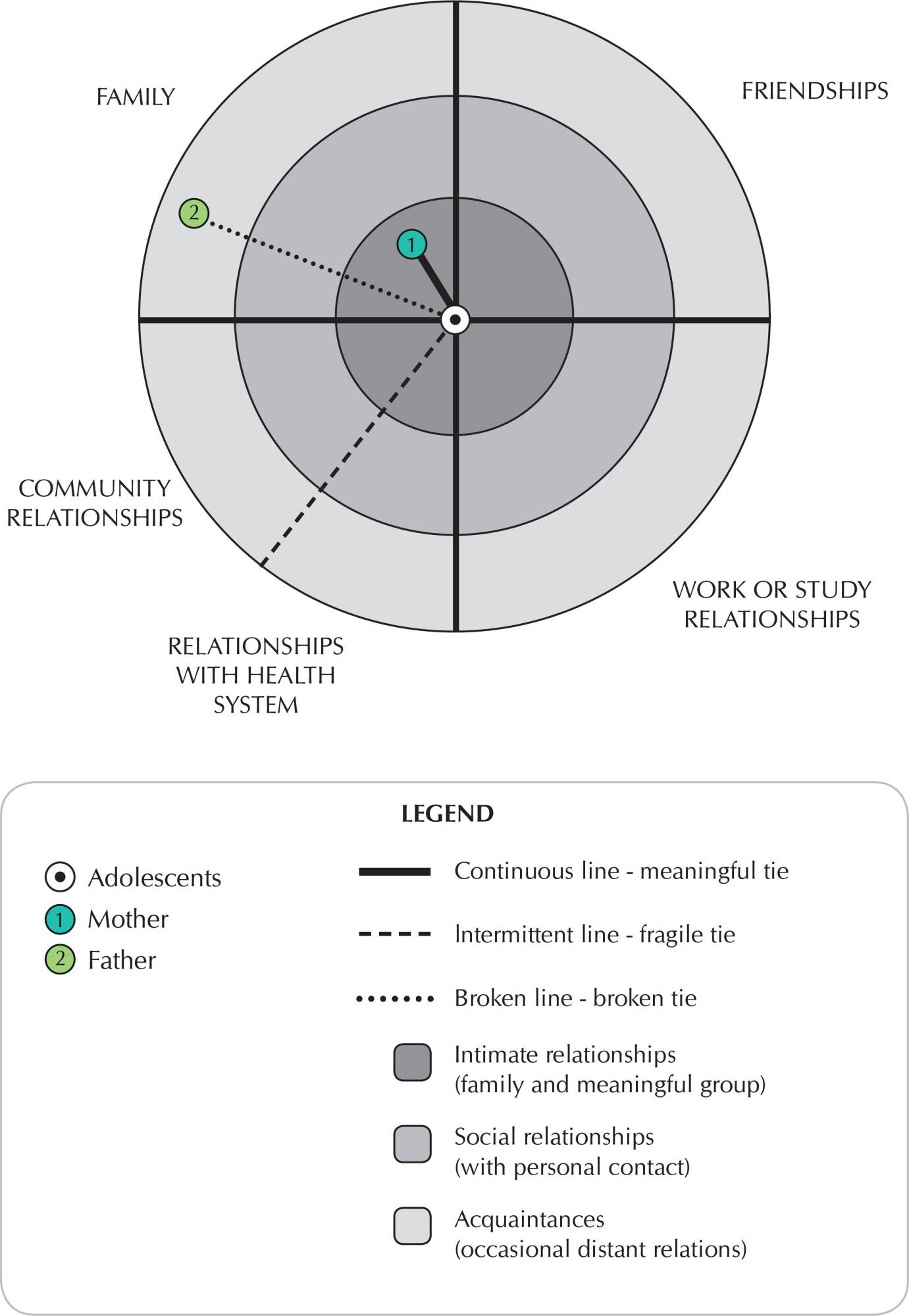
-
01-01-2016
Direct cost of dressings for pressure ulcers in hospitalized patients
Revista Brasileira de Enfermagem. 2016;69(2):290-297
Abstract
Direct cost of dressings for pressure ulcers in hospitalized patients
Revista Brasileira de Enfermagem. 2016;69(2):290-297
DOI 10.1590/0034-7167.2016690212i
Views0See moreABSTRACT
Objective:
to identify the average direct cost (ADC) on the direct labor (DL) for nurses and the consumption of materials and solutions used in performing dressings for pressure ulcers (PU) in hospitalized patients.
Methods:
case study, exploratory and descriptive case conducted in a teaching hospital. For six months, 228 dressings were performed for the treatment of PU patients. We calculated the cost by multiplying the time spent by nurses by the DL unit cost, adding to the cost of materials and solutions consumed.
Results:
the dressings ADC of PU corresponds to US$ 19.18 (PUs-category I); US$ 6.50 (PUs-category II); US$ 12.34 (PUs-category III); US$ 5.84 (PUs-category IV); US$ 9.52 (PUs-unclassifiable) and US$ 3.76 (PU suspected deep tissue injury).
Conclusion:
the methodology used can be reproduced in different hospital settings for the development of other studies to expand and complement the knowledge gained.
-
01-01-2016
Humanization knowledge of undergraduate nursing students
Revista Brasileira de Enfermagem. 2016;69(2):282-289
Abstract
Humanization knowledge of undergraduate nursing students
Revista Brasileira de Enfermagem. 2016;69(2):282-289
DOI 10.1590/0034-7167.2016690211i
Views0See moreABSTRACT
Objective:
identify the senses and practices representative of humanization in the training of undergraduate nursing students.
Method:
a qualitative study, supported on the national policy of humanization and the concept of social representation. An interview was conducted with 40 undergraduate nursing students from a public institution. ALCESTE software was used for lexical content analysis.
Results:
the sense of humanization is built on the practice and disciplines of social and human sciences. The coordination between theory and practice is representative of humanization, but does not take place in learning experiences. The professor’s participation and teamwork are elements that influence humanization.
Conclusion:
humanization should be reinforced in the training of undergraduate nursing students, using learning-teaching strategies and experiences that make sense to students, including alliances between theory and practice, learning and service, research and care.
-
01-01-2016
Prevention of vertical mother-to-child transmission of HIV: care and adhesion provided by couples
Revista Brasileira de Enfermagem. 2016;69(2):275-281
Abstract
Prevention of vertical mother-to-child transmission of HIV: care and adhesion provided by couples
Revista Brasileira de Enfermagem. 2016;69(2):275-281
DOI 10.1590/0034-7167.2016690210i
Views1See moreABSTRACT
Objective:
to unveil the existential movement of a couple when performing vertical HIV transmission prophylaxis.
Method:
qualitative research, using Martin Heidegger’s phenomenological approach. A phenomenological interview was conducted with 14 participants between December/2011 and February/2012 in the outpatient facilities of an university hospital, Brazil. A comprehensive and interpretative heideggerian analysis was developed.
Results:
the couple understands that they have followed the guidance of the health professionals as indicated. By not being able to breastfeed, the woman did not fail to be a mother, but it was also not a complete experience. The senses of the occupation of the couple-being unfolded to the prophylactic treatment and facticity due to the fact of not breastfeeding.
Conclusion:
we indicate the need to rethink care, proposing a working relationship that transcends the impersonal that dictates about what the couple must deal with, enabling their active participation in care decisions and actions.
-
01-01-2016
Attitudes and pleasure/suffering in mental health work
Revista Brasileira de Enfermagem. 2016;69(2):266-274
Abstract
Attitudes and pleasure/suffering in mental health work
Revista Brasileira de Enfermagem. 2016;69(2):266-274
DOI 10.1590/0034-7167.2016690209i
Views0See moreABSTRACT
Objective:
to investigate the existence of a relationship between attitudinal profiles and the pleasure/suffering dynamic in workers of Mental Health Services.
Method:
a quantitative, descriptive-analytical, correlational and cross-sectional study conducted in 2014. We used three instruments: characterization questionnaire, Opinions on Mental Illness Scale and Pleasure and Suffering Indicators at Work Scale, answered by 80 workers of the Network for Psychosocial Care of Alfenas, state of Minas Gerais, Brazil.
Results:
Authoritarianism proved to be the predominant profile. As for the pleasure/suffering at work, Gratification was considered adequate, and indicators such as Freedom, Wear and Insecurity were considered moderate critical. There were positive correlations between the most favorable attitudes and pleasure indicators at work. The values of both scales showed a relationship with socio-demographic and professional variables.
Conclusion:
the less favorable attitudes are prevalent and, in spite of suffering being present, these professionals feel gratified about their work.
-
01-01-2016
Overweight in young adult students: the vulnerability of a distorted self-perception of body image
Revista Brasileira de Enfermagem. 2016;69(2):258-265
Abstract
Overweight in young adult students: the vulnerability of a distorted self-perception of body image
Revista Brasileira de Enfermagem. 2016;69(2):258-265
DOI 10.1590/0034-7167.2016690208i
Views0See moreABSTRACT
Objective:
To analyze overweight in young adult students from the individual dimension of vulnerability, especially its interpersonal and subjective markers.
Method:
An analytical quantitative study was performed with 560 young adults from 26 schools in a capital city in Northeastern Brazil. After obtaining data to administer specific questionnaires, logistic regression was used to identify markers of individual vulnerability.
Results:
In the bivariate analysis, overweight showed a statistically significant association with self-perception of health, satisfaction with body image and self-perception of overweight, the latter remaining in the final regression model.
Conclusion:
It can be mainly concluded that self-perception of overweight is distorted when compared to one’s actual body weight and, for this reason, young adults are vulnerable to dysfunctional health states. However, it was confirmed that this health condition must be understood in an individual and contextual perspective.
-
ORIGINAL ARTICLE09-26-2022
Educational technology for infants’ families to identify warning signs: a validation study
Revista Brasileira de Enfermagem. 2022;75(5):e20210964
Abstract
ORIGINAL ARTICLEEducational technology for infants’ families to identify warning signs: a validation study
Revista Brasileira de Enfermagem. 2022;75(5):e20210964
DOI 10.1590/0034-7167-2021-0964
Views0See moreABSTRACT
Objective:
To validate, with the target audience, the usability and appearance of a serialized album about the warning signs to the health of children below 2 months.
Method:
Methodological validation study with the target population of an educational material in the form of a serialized album. 11 mothers with children under 2 months of age participated. The domains evaluated were: Objectives, Organization, Writing Style, Appearance, and Motivation. Data were analyzed using descriptive and statistics, and the data agreement index was calculated.
Results:
The global data agreement index was high (0.99). Mothers had positive responses, recognizing the excellence of the material: attractive figures that were easy to understand.
Conclusion:
The validation of the serialized album provides mothers with the abilities and knowledge they need to identify warning signs in regard to the health of their children, providing them with autonomy, corresponsibility, and helping them develop better child health practices.
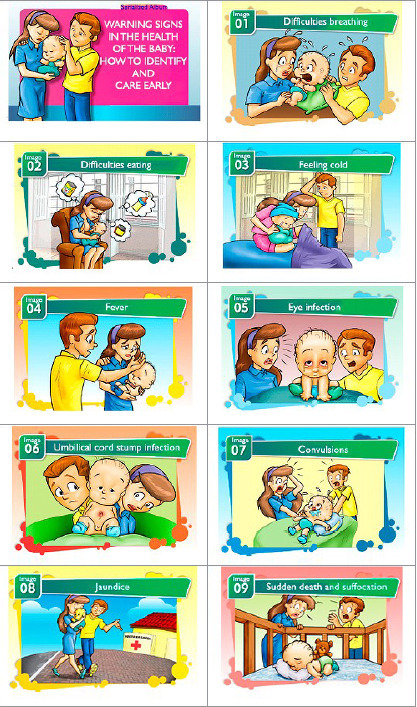
-
ORIGINAL ARTICLE10-17-2022
Validation of the Brazilian Portuguese version of the Venous International Assessment Scale and proposal of revision
Revista Brasileira de Enfermagem. 2022;75(5):e20220100
Abstract
ORIGINAL ARTICLEValidation of the Brazilian Portuguese version of the Venous International Assessment Scale and proposal of revision
Revista Brasileira de Enfermagem. 2022;75(5):e20220100
DOI 10.1590/0034-7167-2022-0100
Views0See moreABSTRACT
Objective:
To validate the Brazilian Portuguese translation and analyze the cultural adaptation of the Venous International Assessment Scale.
Methods:
Observational study by employing the Delphi technique and an equivalence evaluation by experts. The results were analyzed using item scores and by content validity index calculations of item, scale, and universal agreement.
Results:
Three rounds of evaluation were necessary for consensus. Explanatory contents were incorporated into the original scale throughout the process, resulting in a new version: VIA Scale – Revised. This scale obtained a content validity index of 0.96 and a universal agreement of 0.78. In the cross-cultural adequacy analysis phase, a score of 0.77 was obtained. The majority (90.5%) of the participants judged the scale’s decision support property as positive.
Conclusion:
The VIA Scale was validated and culturally adapted to the Brazilian Portuguese language, resulting in the VIA Scale – Revised (VIA-R).
-
ORIGINAL ARTICLE07-29-2022
Effects of guided imagery relaxation in hematopoietic stem-cell transplantation patients: a quasi-experimental study
Revista Brasileira de Enfermagem. 2022;75(5):e20220114
Abstract
ORIGINAL ARTICLEEffects of guided imagery relaxation in hematopoietic stem-cell transplantation patients: a quasi-experimental study
Revista Brasileira de Enfermagem. 2022;75(5):e20220114
DOI 10.1590/0034-7167-2022-0114
Views1See moreABSTRACT
Objective:
To analyze the effects of the technique of virtual reality guided imagery in the vital signs of hematopoietic stem-cell transplantation patients.
Method:
Quasi-experimental study with 35 participants who received an intervention using virtual reality guided imagery with progressive muscle relaxation, applied three times a week for four weeks in a referral hospital for transplants in the south of Brazil. Data collected included: temperature, arterial pressure, respiratory rate, heart rate, pain, and oxygen saturation, before and after each intervention. The comparisons were analyzed using Wilcoxon’s test.
Results:
There was a clinical significance between the mean measurements before and after for respiratory rate (p=0.00) in all stages, and for the variables Heart rate, Temperature, and Oxygen saturation from the 1st to the 12th measurements (p=0.05).
Conclusion:
The intervention was low cost, easy to apply, and showed positive effects, presenting itself as an option for patient-focused care.
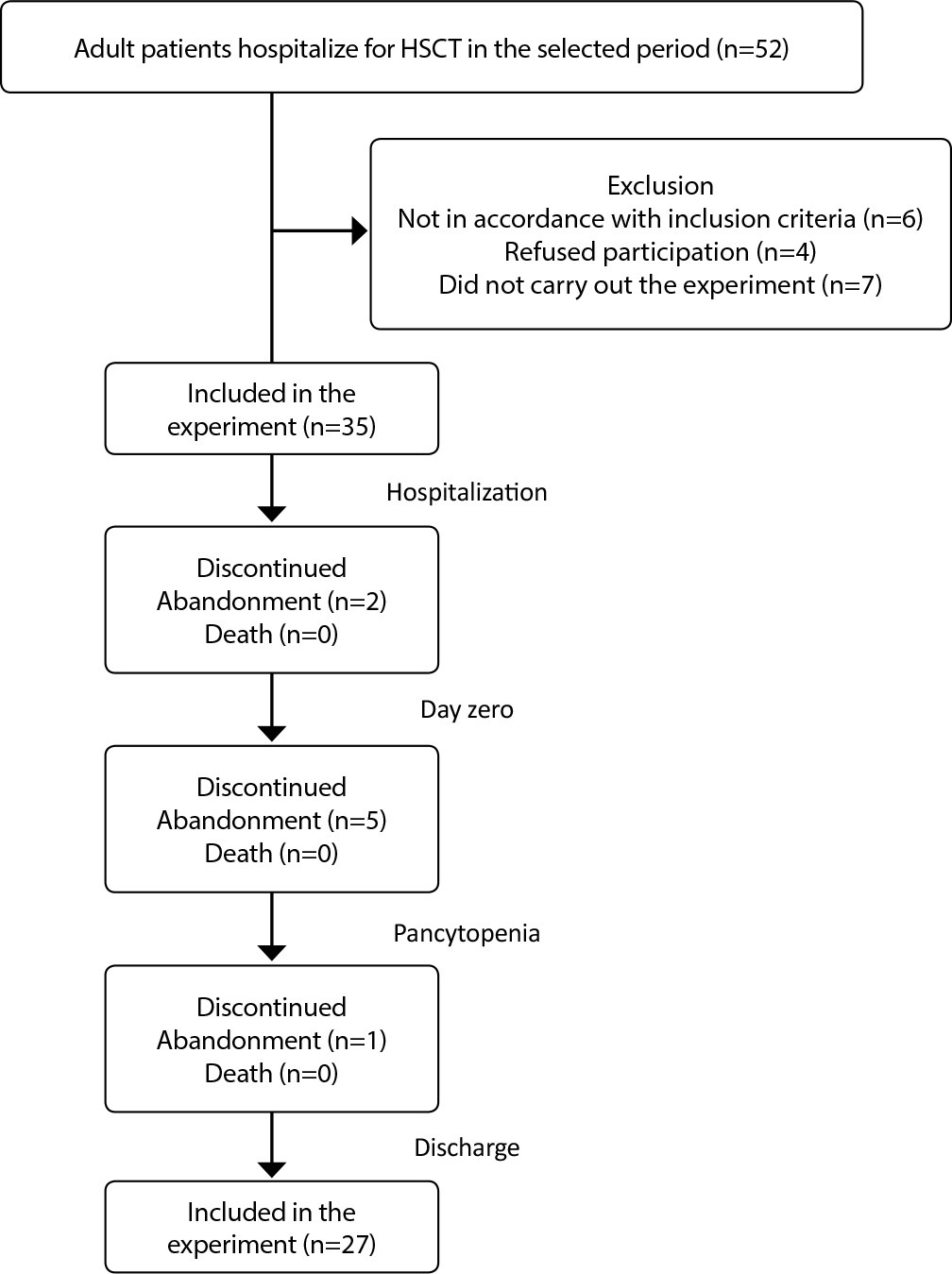
-
ORIGINAL ARTICLE10-17-2022
Semantic validation of educational technology with caregivers of children and adolescents undergoing chemotherapy
Revista Brasileira de Enfermagem. 2022;75(5):e20220294
Abstract
ORIGINAL ARTICLESemantic validation of educational technology with caregivers of children and adolescents undergoing chemotherapy
Revista Brasileira de Enfermagem. 2022;75(5):e20220294
DOI 10.1590/0034-7167-2022-0294
Views0See moreABSTRACT
Objective:
Semantically validate an educational technology with the caregiver of children and adolescents undergoing chemotherapy.
Method:
Methodological study, with a quantitative approach, guided by the theoretical framework of psychometry, developed between March and April 2022, with nine caregivers of children and adolescents undergoing chemotherapy. Educational technology is a digital animation film about the pediatric chemotherapy treatment process, used as a tool for health education.
Results:
In the reliability assessment, the Intraclass Correlation Coefficient was 0.936 [95%CI 0.868-0.984] with p < 0.05 and Cronbach’s alpha of 0.943, demonstrating satisfactory internal consistency. Regarding the semantic analysis, the domains related to objectives, organization, language, appearance, and motivation showed an agreement rate above 80%.
Conclusion:
Educational technology showed satisfactory rates, proving to be a valid, reliable, and important instrument to be used by caregivers of children and adolescents undergoing chemotherapy.
-
10-21-2022
Cancer symptom clusters: from the lab bench to clinical practice
Revista Brasileira de Enfermagem. 2022;75(5):e2022v75n5inov
Abstract
Cancer symptom clusters: from the lab bench to clinical practice
Revista Brasileira de Enfermagem. 2022;75(5):e2022v75n5inov
DOI 10.1590/0034-7167-2022v75n5inov
Views0See moreABSTRACT
Objective:
to present and discuss the advancement of science in symptom management through research involving oncological symptom clusters (OSC).
Method:
a reflective study, supported by the scientific literature on OSC.
Results:
five key points are crucial to advancing the science of symptom management through research involving OSC: definition of OSC characteristics; underlying mechanisms and priority symptom clusters; OSC measurement; targeted and personalized interventions; new analytical strategies.
Final considerations:
a better understanding of the complex connections between different systems and biobehavioral aspects in patients, especially in the field of oncology nursing, is urgent. The study of these interactions has become increasingly promising and emerging for oncology nursing, since therapeutic interventions, whose target is the neuroimmunoendocrine axis, are relevant for personalized care, translating into greater scientific and nurse autonomy to care for patients.
-
ORIGINAL ARTICLE06-24-2022
Prevalence of the Human Immunodeficiency Virus and associated factors in pregnant women in the state of Pará
Revista Brasileira de Enfermagem. 2022;75(6):e20210171
Abstract
ORIGINAL ARTICLEPrevalence of the Human Immunodeficiency Virus and associated factors in pregnant women in the state of Pará
Revista Brasileira de Enfermagem. 2022;75(6):e20210171
DOI 10.1590/0034-7167-2021-0171
Views0See moreABSTRACT
Objectives:
to analyze the prevalence of the Human Immunodeficiency Virus and the associated factors in pregnant women in the state of Pará.
Methods:
retrospective, analytical, quantitative study with a sample of 332 medical records of HIV-positive pregnant women hospitalized at the Referral Maternity Hospital in the state of Pará between 2010 and 2019. Bivariate and multivariate statistical analysis were performed with the variables collected.
Results:
the average prevalence in the period was 2.39% and the Metropolitan Region concentrated 66.87% of cases. There was a strong relationship between the number of antenatal consultations and lack of knowledge of serological status (p value equal to 0.01E-17) variables, and a correlation between the education and number of antenatal consultations variables.
Conclusions:
the increase in the infection rate during the study period revealed the need to intensify health actions, early diagnosis and strategies to improve adherence to antiretroviral treatment for maternal viral suppression and reduction of the risk of vertical transmission, contributing to improve public policies.
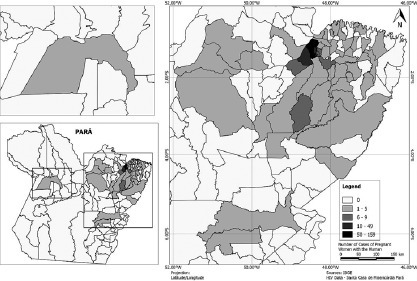
-
ORIGINAL ARTICLE10-03-2022
Evaluation of respiratory complications in a cohort of preterm infants who did not receive palivizumab monoclonal antibodies
Revista Brasileira de Enfermagem. 2022;75(6):e20210362
Abstract
ORIGINAL ARTICLEEvaluation of respiratory complications in a cohort of preterm infants who did not receive palivizumab monoclonal antibodies
Revista Brasileira de Enfermagem. 2022;75(6):e20210362
DOI 10.1590/0034-7167-2021-0362
Views0See moreABSTRACT
Objectives:
to analyze the occurrence of respiratory complications over the first year of life in preterm infants who did not receive palivizumab monoclonal antibodies.
Methods:
analytical retrospective cohort study with preterm infants born between 2012 and 2016 in Uberlândia, state of Minas Gerais, Brazil. Data collection occurred from January to November 2018, by consulting hospital and primary healthcare medical records. Data were processed with the Poisson regression model, with p<0.05.
Results:
of a total of 5,213 preterm births, 504 (9.7%) met the inclusion criteria. The preterm infants in this subset were assisted 2,899 times in primary care, which resulted in 1,098 (37.5%) medical diagnoses, of which 803 (78.5%) involved the respiratory tract. Preterm babies fed on formula milk at hospital discharge had more diagnoses of respiratory diseases. Maternal age (p=0.039), respiratory diagnosis at hospital discharge (p=0.028), and number of sporadic appointments (p<0.001) showed a significant association with bronchiolitis; number of sporadic appointments showed a significant association with occurrence of respiratory diseases; and breastfeeding had a protective effect against the development of bronchiolitis.
Conclusions:
preterm infants who did not receive palivizumab showed a high percentage of respiratory diseases, and breastfeeding helped protect them against bronchiolitis. It is recommended that these preterm babies be monitored in primary health care.
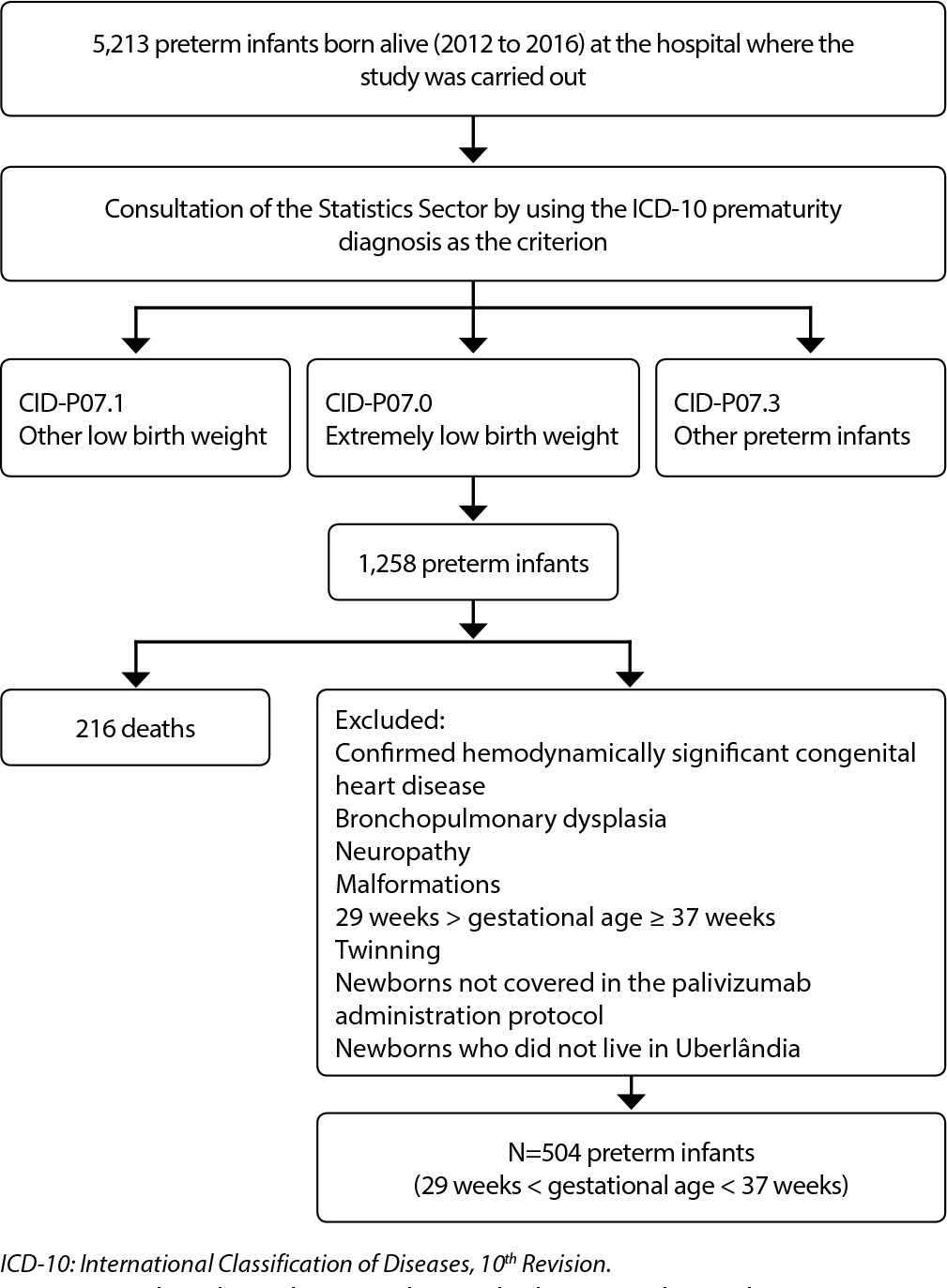
-
ORIGINAL ARTICLE09-09-2022
Palliative care management by caregivers in home care: theoretical validation in a conversation circle
Revista Brasileira de Enfermagem. 2022;75(6):e20210737
Abstract
ORIGINAL ARTICLEPalliative care management by caregivers in home care: theoretical validation in a conversation circle
Revista Brasileira de Enfermagem. 2022;75(6):e20210737
DOI 10.1590/0034-7167-2021-0737
Views0See moreABSTRACT
Objectives:
to present the validation process of a Grounded Theory on the management of palliative care at home by a caregiver of a family member who experiences a death/dying process.
Methods:
a qualitative, explanatory research, which validated a theoretical matrix through a conversation circle containing 15 family caregivers and nine healthcare professionals, in December 2018.
Results:
forty-six propositions were validated regarding family caregivers’ contextual, causal, intervening conditions, consequences and action strategies to deal with the dying and death process of a family member. Conversation circles encouraged dialogue and (re)signification of the senses and knowledge of those involved, proving to be a way of educating and promoting the exercise of citizenship by participants.
Final Considerations:
the conversation circle made it possible for participants to interact and share information and experiences regarding home care for palliative patients and their families.

-
ORIGINAL ARTICLE03-30-2020
Risk and protective factors for sudden infant death syndrome
Revista Brasileira de Enfermagem. 2020;73(2):e20190458
Abstract
ORIGINAL ARTICLERisk and protective factors for sudden infant death syndrome
Revista Brasileira de Enfermagem. 2020;73(2):e20190458
DOI 10.1590/0034-7167-2019-0458
Views0See moreABSTRACT
Objectives:
To verify the occurrence of the risk and protective factors for sudden infant death syndrome during nursing consultation.
Methods:
Retrospective cohort study conducted based on medical records from a primary care unit in the municipality of São Paulo. The sample consisted of 63 infants assisted from January to December 2016.
Results:
The average age of infants was 3.2 months. The main risk factors identified were the presence of soft objects in the crib (93.6%) and bed sharing (58.7%). Predominant protective factors were breastfeeding (95.2%) followed by updated immunization (90.5%).
Conclusions:
Risk and protective factors for sudden infant death syndrome were identified in the study sample, indicating the importance of addressing the issue with families of children under 1 year of age to prevent the occurrence of such events.
-
ORIGINAL ARTICLE12-21-2020
Physical violence and verbal abuse against nurses working with risk stratification: characteristics, related factors, and consequences
Revista Brasileira de Enfermagem. 2020;73:e20190882
Abstract
ORIGINAL ARTICLEPhysical violence and verbal abuse against nurses working with risk stratification: characteristics, related factors, and consequences
Revista Brasileira de Enfermagem. 2020;73:e20190882
DOI 10.1590/0034-7167-2019-0882
Views0See moreABSTRACT
Objective:
to analyze the characteristics, related factors, and consequences of physical violence and verbal abuse against nurses working with risk stratification.
Methods:
a cross-sectional, descriptive and quantitative study carried out with 80 nurses who work with risk stratification in emergency services. Data were collected using an adapted instrument and analyzed using (uni)bivariate inferential statistics.
Results:
companions were the main perpetrators of verbal abuse (86.1%); and patients inflicted physical violence (100%). Professionals with up to five years of experience are 74% less likely to suffer physical violence (p=0.029). Women suffer 5.83 times more verbal abuse than men (p=0.026). Sadness (15.8%) and fear of the aggressor (15.3%) were the main consequences of verbal abuse; and fear of the aggressor (22.2%) and stress (22.2%) were results of physical violence.
Conclusion:
violence is influenced by institutional, professional and client aspects. Therefore, coping with it requires multidimensional strategies.

-
ORIGINAL ARTICLE07-31-2020
Educational demands of family members of children with special health care needs in the transition from hospital to home
Revista Brasileira de Enfermagem. 2020;73:e20190156
Abstract
ORIGINAL ARTICLEEducational demands of family members of children with special health care needs in the transition from hospital to home
Revista Brasileira de Enfermagem. 2020;73:e20190156
DOI 10.1590/0034-7167-2019-0156
Views0See moreABSTRACT
Objectives:
to analyze the educational demands of family members of children with special health care needs in the transition from hospital to home
Methods:
qualitative research conducted between February and June 2018, using the handbook on creativity and sensitivity dynamics, from the sensitive creative method; the participants were nine family caregivers of children admitted to a public hospital in Rio de Janeiro; the data were subjected to French discourse analysis
Results:
the educational demands were clinical, centered on the categories complex and continuous care, technological care, modified habits, medication, development and mixed care, and social, related to the supplies and rights of children
Final Considerations:
the social educational demand has emerged as a new demand to be incorporated in the care of these children. The transition from hospital to home should be progressive and have the nurse as its coordinator, with the objective of providing participatory, safe, quality care, articulated within a social network
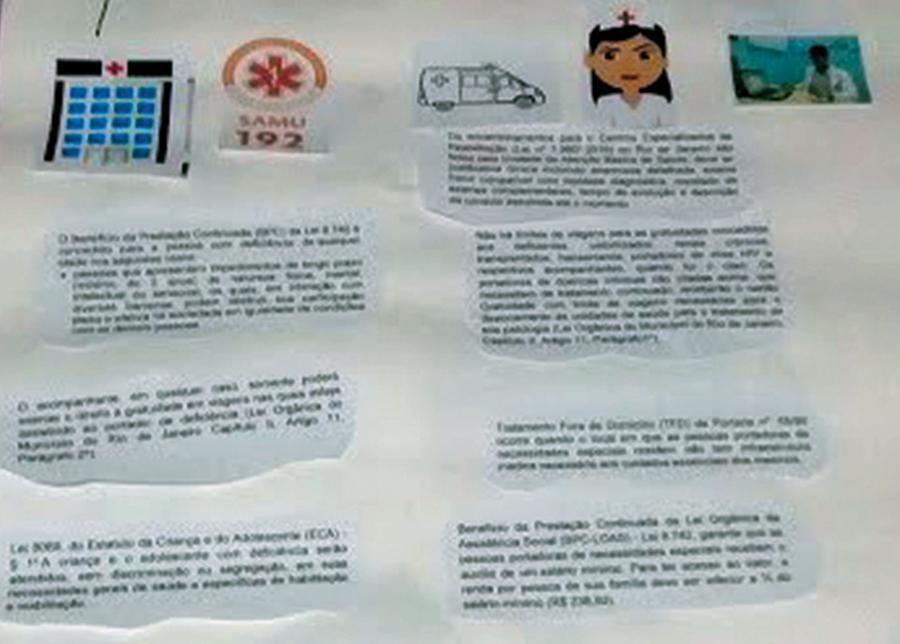
-
REVIEW09-19-2022
Authentic leadership in the educational system and in nursing education: an integrative review
Revista Brasileira de Enfermagem. 2022;75(1):e20220122
Abstract
REVIEWAuthentic leadership in the educational system and in nursing education: an integrative review
Revista Brasileira de Enfermagem. 2022;75(1):e20220122
DOI 10.1590/0034-7167-2022-0122
Views0See moreABSTRACT
Objectives:
to identify and analyze the knowledge produced in literature about authentic leadership in the educational system, as well as in nursing education.
Methods:
an integrative review, carried out in the Scopus, Web of Science, CINAHL, MEDLINE/PubMed, ERIC, LILACS databases. Articles that addressed authentic leadership in the educational system from a general perspective and within the nursing scope, as well as teaching practices of this leadership model, were eligible.
Results:
twenty-three articles met the inclusion criteria, most published in 2019, highlighting studies in the context of teaching, with a predominance in the nursing course and which were synthesized into three thematic categories.
Final Considerations:
it was found that the higher the levels of authentic leadership in the educational system, the higher the rates of other positive factors related to it, such as trust, involvement, academic optimism, responsibility, creativity, among others.

-
ORIGINAL ARTICLE07-31-2020
Social and obstetric inequalities and vaccination in pregnant women
Revista Brasileira de Enfermagem. 2020;73:e20190099
Abstract
ORIGINAL ARTICLESocial and obstetric inequalities and vaccination in pregnant women
Revista Brasileira de Enfermagem. 2020;73:e20190099
DOI 10.1590/0034-7167-2019-0099
Views0See moreABSTRACT
Objectives:
to analyze the association of socioeconomic level and obstetric characteristics with vaccine registration of pregnant women.
Methods:
cross-sectional study, performed with 480 women in puerperal. Vaccination of pregnant women was considered a dependent variable and as independent variables were age, skin color, education, steady union, paid work, and number of prenatal consultations. Association between variables was verified by the Poisson’s regression model.
Results:
from 480 pregnant women’s health cards, 10.63% had information on hepatitis B vaccination; 31.46% for tetanus; and 90% of the health cards had not register for influenza. There was an association of paid work and number of prenatal consultations with hepatitis B vaccination.
Conclusions:
lower percentages in absence of vaccination occurred in women who were in the job market and had a higher number of prenatal consultations. This suggests that socioeconomic inequalities may interfere with the vaccination of pregnant women in health services.
-
EXPERIENCE REPORT06-11-2021
Care management in coping with COVID-19 at a teaching hospital
Revista Brasileira de Enfermagem. 2021;74:e20200970
Abstract
EXPERIENCE REPORTCare management in coping with COVID-19 at a teaching hospital
Revista Brasileira de Enfermagem. 2021;74:e20200970
DOI 10.1590/0034-7167-2020-0970
Views0See moreABSTRACT
Objective:
to report the experience of implementing care management strategies in coping with the COVID-19 pandemic in a teaching hospital.
Method:
this is an experience report of the managers who work at the largest public hospital in Paraná with functions as Head of the Care Management Division, Head of the Care Lines Management Sector, Head of the Infectiology Unit and support team.
Results:
care management strategies were structured based on the service dynamics; physical structure; human Resources; professional and user safety.
Final considerations:
preparing for a pandemic involves measures that include modifying infrastructure and processes, managing employees and users, infection prevention strategies, and clinical recommendations. These measures are necessary to optimize the quality of care provided to users with COVID-19 and to reduce the risk of viral transmission to other users or health professionals.
-
ORIGINAL ARTICLE06-01-2020
Workplace violence types in family health, offenders, reactions, and problems experienced
Revista Brasileira de Enfermagem. 2020;73:e20190055
Abstract
ORIGINAL ARTICLEWorkplace violence types in family health, offenders, reactions, and problems experienced
Revista Brasileira de Enfermagem. 2020;73:e20190055
DOI 10.1590/0034-7167-2019-0055
Views0See moreABSTRACT
Objective:
to identify the types of violence that affect the health team in Family Health Units, their offenders, reactions and problems experienced by workers.
Method:
a cross-sectional, concurrent mixed-type research. The Survey Questionnaire Workplace Violence in the Health Sector was applied to 106 workers from Family Health Units. Of these, 18 answered the semi-structured interview.
Results:
verbal aggression (65.1%), bullying (14.2%), racial discrimination (10.4%), physical assault (8.5%) and sexual harassment (4.7%) were prevalent. Patients were the main perpetrators of verbal aggression (79.4%) and bullying (46.7%). Workers responded by telling co-workers and reporting to the boss. Victims remained over-alert, vigilant and tense, relating exposure to violence to absenteeism and the desire to leave the profession.
Conclusion:
verbal aggression is the most common violence with negative impact on workers’ health and work performed.
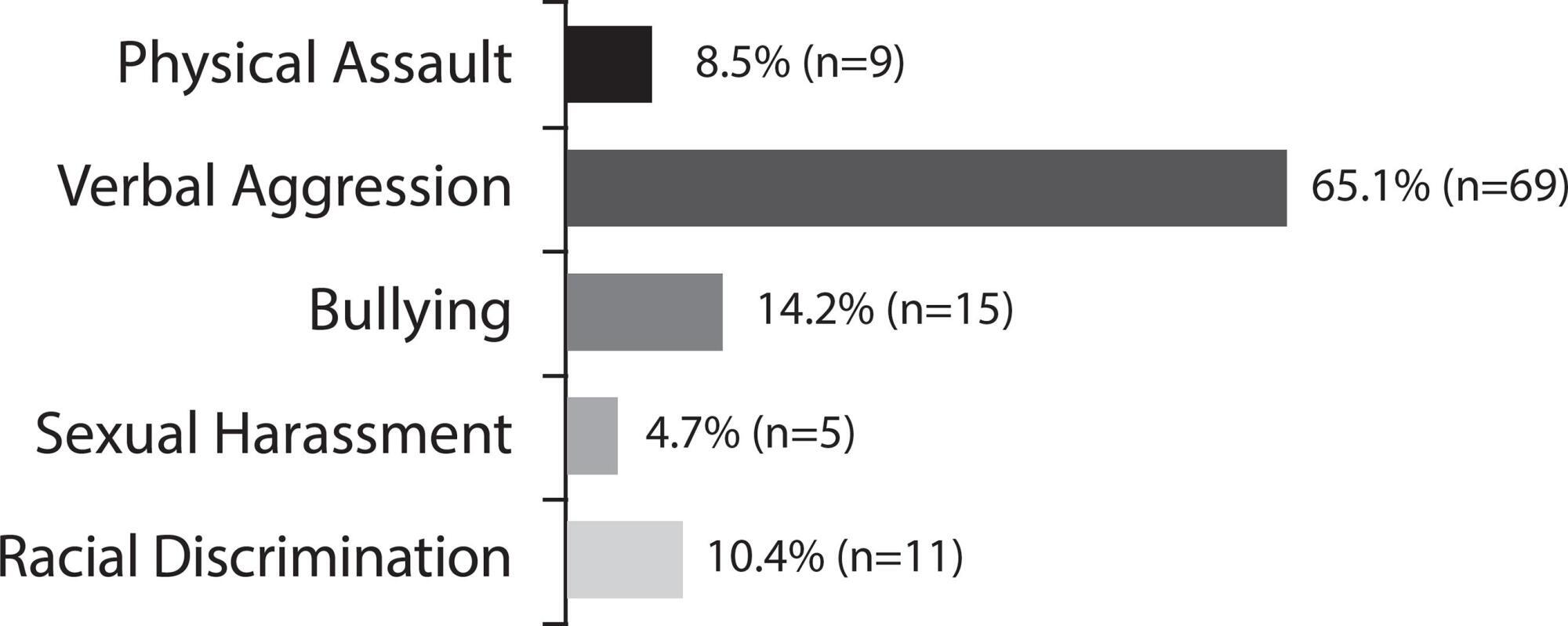
-
ORIGINAL ARTICLE06-08-2020
Teaching in health residencies: knowledge of preceptors under Shulman’s analysis
Revista Brasileira de Enfermagem. 2020;73(4):20180779
Abstract
ORIGINAL ARTICLETeaching in health residencies: knowledge of preceptors under Shulman’s analysis
Revista Brasileira de Enfermagem. 2020;73(4):20180779
DOI 10.1590/0034-7167-2018-0779
Views0See moreABSTRACT
Objectives:
to understand how the pedagogical knowledge that integrates the basic knowledge of teaching is perceived by preceptors in residents’ teaching-learning process.
Methods:
a qualitative research conducted by semi-structured interview from December 2013 to July 2014, with 31 preceptors of residency programs of three university hospitals in northeastern Brazil. For analysis, the Grounded Theory’s proposal was used and supported by Atlas ti(r) 7.0 software.
Results:
preceptors integrate preceptorship with basic teaching knowledge proposed by Lee Shulman, with emphasis on General Pedagogical Knowledge when seeking strategies to better work on specific and disciplinary content, and Pedagogical Content Knowledge when adapting content to make it comprehensible to residents.
Final Considerations:
the study allowed us to understand how Shulman’s basic knowledge of teaching is perceived by preceptors. It is recognized that they integrate knowledge into the preceptorship, highlighting the General and Pedagogical Content Knowledge.
Search
Search in:
Nuvem de Tags
Adolescente (85) Atenção Primária à Saúde (239) COVID-19 (91) Criança (91) Cuidados de Enfermagem (269) Educação em Enfermagem (151) Educação em Saúde (139) Enfermagem (930) Enfermagem Pediátrica (86) Estudantes de Enfermagem (77) Estudos de Validação (131) Família (87) Idoso (208) Promoção da Saúde (99) Qualidade de Vida (104) Saúde do Trabalhador (86) Saúde Mental (145) Saúde Pública (82) Segurança do Paciente (150) Tecnologia Educacional (100)



